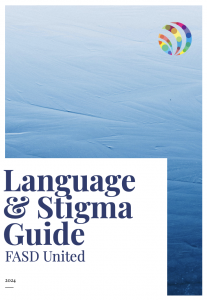Language and Stigma Guide Published by FASD United Will Combat Stigma and Empower the FASD Community
WASHINGTON, DC, UNITED STATES, January 21, 2025 /EINPresswire.com/ -- FASD United is taking a major step towards countering stigma by releasing its highly anticipated Language and Stigma Guide, a bold new resource that will improve the way FASD (fetal alcohol spectrum disorders) is discussed. The guide is now available from FASD United to view and download.
FASD, a range of disabilities that can occur with prenatal alcohol exposure,
is misunderstood and unrecognized by existing systems of care. Due to a national increase in the rate of alcohol use during pregnancy, with as many as 1 in 20 Americans having an FASD, the need to create FASD-informed systems and communications is crucial.The guide serves as a call to action for society to rethink how we speak about people with FASD, how we dismantle damaging stereotypes, and how we create a culture of empathy rather than judgment. In a world where language is power, the way we talk about FASD can either uplift or harm.
What is the Language and Stigma Guide?
The Language and Stigma Guide is a comprehensive resource for both individuals and organizations who want to contribute to changing the narrative around FASD. The guide offers practical recommendations for using person-first language, debunking harmful myths, and fostering a culture of inclusion. It also provides actionable tips for minimizing stigma in everyday conversations and within professional settings.
The Language and Stigma Guide is intended for a broad audience, including families and caregivers, healthcare professionals, educators and social workers, as well as advocates and the general public.
Importance of Reducing Stigma and Shifting Language
The stigma associated with FASD is deeply entrenched in society and can have profound consequences on individuals, families, and communities. Misunderstandings and negative stereotypes often lead to discrimination, social exclusion, and a lack of access to appropriate resources. A shift in language can be a catalyst for this change, creating more welcoming environments in schools, workplaces, healthcare settings, and beyond.
“We know how easy it is to slip into the ‘one-size-fits-all’ narrative when talking about conditions like FASD—stereotyping, oversimplifying, and ultimately dehumanizing those who are already facing enormous challenges. This guide is about giving people the space to be more than their diagnosis and for them to be seen as individuals first,” says Sophie Sissi, Media Director of FASD United. “It’s not about avoiding the hard truths of FASD, it’s about expressing those truths in a way that empowers, not diminishes.”
What’s inside the guide?
The Power of Person-First Language: The guide encourages language that highlights the person before the diagnosis. Rather than talking about “an FASD child,” the guide describes how saying “a child with FASD” is more empowering. A small change, but one that can change how individuals are perceived—and how they perceive themselves.
Debunking Stigma: The guide takes a deep dive into how language reinforces stigma and how to counter that by replacing words and phrases that invoke blame and shame with language driven by empathy and support.
Real-World Examples: The guide features many real-life examples to demonstrate how language choices can either perpetuate stigma or pave the way for greater understanding.
A Cultural Reset: The guide is about building a culture of empathy, one conversation at a time. It’s about bringing more people into the conversation and empowering those impacted by FASD to own their stories without fear of judgment.
The Language and Stigma Guide is not simply a “how-to” manual. It is a powerful statement calling for a more inclusive, compassionate conversation around FASD. It includes the facts, and it also has heart. The Language and Stigma Guide unapologetically confronts language that perpetuates harmful stereotypes that hold people back and offers clear alternatives to counter destructive stigma.
About FASD United
For nearly 35 years, FASD United has served as the national organization dedicated to advocating for individuals and families impacted by fetal alcohol spectrum disorders. Through groundbreaking education, awareness campaigns, and direct advocacy, FASD United is on a mission to combat stigma and improve outcomes for those living with FASD.
Contact Us for More Information
FASD United is proud to present this document as a tool and resource for those interested in expanding their awareness and understanding of stigma-free messaging related to FASD, substance use, and individuals with living experience. To learn more about how to utilize the Language and Stigma Guide and support the mission of FASD United, please contact us. Now is the time to rewrite the story around FASD—you can be part of it!


No comments:
Post a Comment